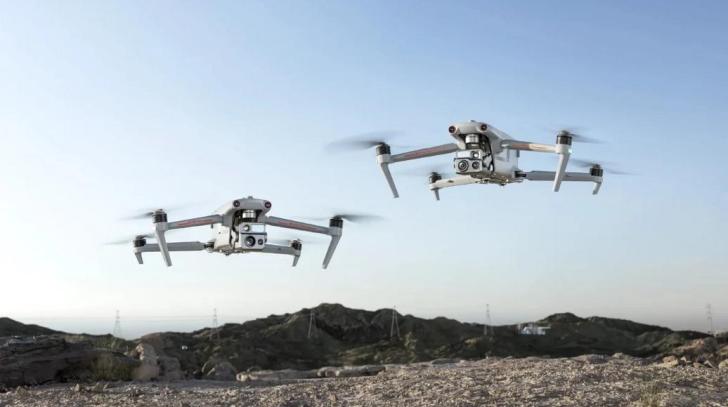News / National
Drones help intercept over 1,000 undocumented migrants at Beitbridge
23 Apr 2025 at 07:38hrs |
1 Views

Border Management Authority (BMA) Commissioner Dr Michael Masiapato has praised the use of drones in helping intercept more than 1,000 undocumented migrants attempting to enter South Africa illegally over the Easter weekend.
Masiapato confirmed that all those arrested will be deported to their homelands.
"Without drones, this work becomes very expensive and ineffective. We would be patrolling blindly, not knowing if we would encounter people," Masiapato said on Monday during a media briefing at Beitbridge Border Post.
He admitted the BMA has long faced challenges intercepting undocumented migrants, but said the introduction of drones has significantly improved their operations.
"With drones, we can now monitor vulnerable segments along the border and corridors. At Beitbridge, including the river crossing, we can see individuals using makeshift boats to cross. Once detected, we send coordinates to our ground teams, who move in to intercept them," Masiapato said.
He revealed that more than 1,000 illegal foreigners had been intercepted in the four days over the Easter weekend, due to the assistance of the drones.
The BMA also plans to implement a targeted approach to intercept facilitators assisting undocumented migrants to cross into South Africa illegally.
Home Affairs Minister Leon Schreiber recently launched four drones and 40 body-worn cameras to strengthen border security.
The new technologies were deployed for the first time over Easter.
South Africa shares borders with Lesotho, Botswana, Eswatini, Mozambique, Namibia, and Zimbabwe.
However, these borders have long been plagued by illegal migration, cross-border crime, smuggling, and human trafficking, issues exacerbated by porous borders, corruption, and poor infrastructure.
IOL News previously reported that Masiapato criticised neighbouring countries such as Zimbabwe, Mozambique and Lesotho for not doing enough to curb illegal migration, saying the problem affects South Africa more directly.
"Illegal migration is complicated, and it's South Africa that bears the brunt," he said.
"Our neighbours do not allocate many resources to it, understandably, because it does not affect them directly. We continue to engage, but the problem persists."
He said the root causes of illegal immigration — unemployment and socioeconomic issues in neighbouring countries — are political matters that must be addressed at higher levels.
While acknowledging that South Africa faces similar challenges, Masiapato said the country remains a "pull factor" due to its relatively better economic conditions.
Masiapato confirmed that all those arrested will be deported to their homelands.
"Without drones, this work becomes very expensive and ineffective. We would be patrolling blindly, not knowing if we would encounter people," Masiapato said on Monday during a media briefing at Beitbridge Border Post.
He admitted the BMA has long faced challenges intercepting undocumented migrants, but said the introduction of drones has significantly improved their operations.
"With drones, we can now monitor vulnerable segments along the border and corridors. At Beitbridge, including the river crossing, we can see individuals using makeshift boats to cross. Once detected, we send coordinates to our ground teams, who move in to intercept them," Masiapato said.
He revealed that more than 1,000 illegal foreigners had been intercepted in the four days over the Easter weekend, due to the assistance of the drones.
The BMA also plans to implement a targeted approach to intercept facilitators assisting undocumented migrants to cross into South Africa illegally.
Home Affairs Minister Leon Schreiber recently launched four drones and 40 body-worn cameras to strengthen border security.
The new technologies were deployed for the first time over Easter.
South Africa shares borders with Lesotho, Botswana, Eswatini, Mozambique, Namibia, and Zimbabwe.
However, these borders have long been plagued by illegal migration, cross-border crime, smuggling, and human trafficking, issues exacerbated by porous borders, corruption, and poor infrastructure.
IOL News previously reported that Masiapato criticised neighbouring countries such as Zimbabwe, Mozambique and Lesotho for not doing enough to curb illegal migration, saying the problem affects South Africa more directly.
"Illegal migration is complicated, and it's South Africa that bears the brunt," he said.
"Our neighbours do not allocate many resources to it, understandably, because it does not affect them directly. We continue to engage, but the problem persists."
He said the root causes of illegal immigration — unemployment and socioeconomic issues in neighbouring countries — are political matters that must be addressed at higher levels.
While acknowledging that South Africa faces similar challenges, Masiapato said the country remains a "pull factor" due to its relatively better economic conditions.
Source - IOL
Join the discussion
Loading comments…





























